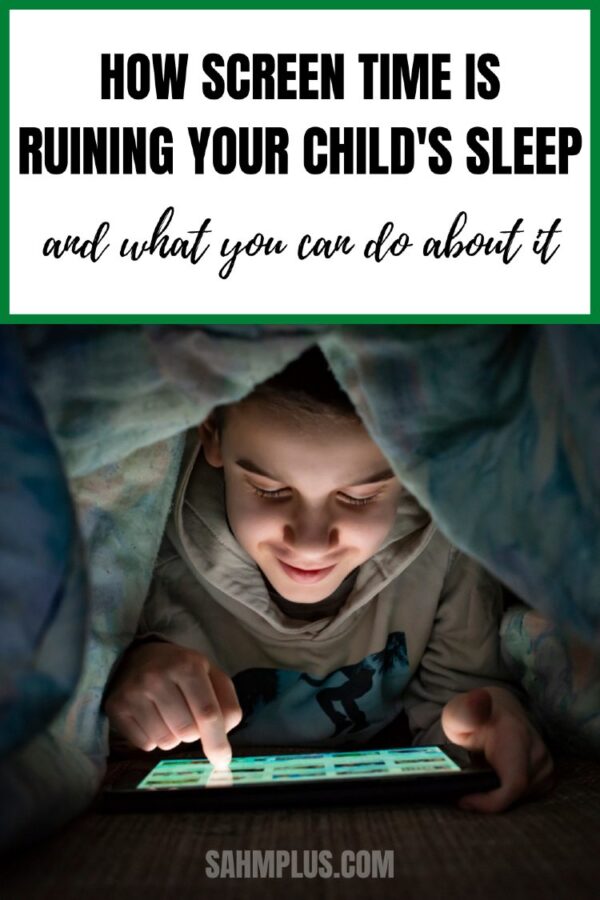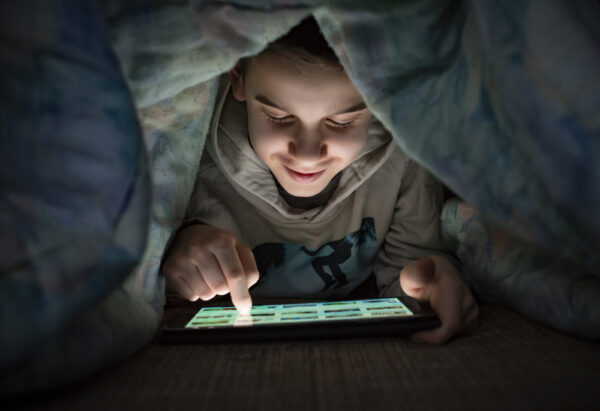Many parents question how much screen time is healthy, but we’re in an age where electronics are hard to avoid, right? Well, is screen time affecting children’s sleep, really? How about behaviors in general? This is how technology and screen addiction can affect your child’s sleep and overall wellbeing and what you can do about it.
Did you know that, worldwide, people spend an average of nearly 7 hours looking at screens each day? And data suggests that U.S. children’s recreational screen time doubled in May of 2020 to 7.7 hours. That’s right, that 7.7 hours doesn’t include school-related computer activities.
For those of us who grew up playing Oregon Trail in school or learning DOS programming, these screen time statistics probably come as no surprise. We remember the days of dial-up … waiting to make a connection just to be told by our parents we had to free up the phone line for an important call. We were not as “connected” as we are today, but it’s likely we all exhibited some form of addiction even back then.
Now though, our children are practically born with screens in their faces and they’re getting an even earlier start with exposure to this very addictive technology.
We all know kids love screens. But are we putting their health and sleep at risk by letting them scroll and binge? Do you really want to know the truth when it comes to choosing between entertaining your kid or completing a work project that you’re dangerously close to being late on delivering.
Nope, don’t really want to know, but turns out we all need to hear it.
The effects of screen time on children may be detrimental to their physical and mental health – leading to obesity, diabetes and depression. Additionally, being glued to a screen before bed is a major contributor to poor sleep in children.

Is Screen Time Affecting Children’s Sleep?
Screen time has been linked to several negative effects on children, from attention problems to obesity. Now, a new study suggests that screens might also be affecting their sleep.
The study found that the more time kids spent in front of TVs and computers, the less sleep they got. Researchers found that for every hour spent in front of screens, children slept about 20 minutes less.
This is important because sleep deprivation can lead to numerous health problems like depression and heart disease.
Developmental psychologist and author of Slaying Digital Dragons: Tips and Tools for Protecting Your Body, Brain, Psyche, and Thumbs from the Digital Dark Side, Alex J. Packer, Ph.D. says “Optimal sleep time for teens is eight to ten hours a night. Yet 70% of teens get seven or fewer hours of sleep a night. This can lead to serious health consequences. Sleep-deprived teens are more likely to be grouchy, moody, anxious, depressed, and forgetful. They’re at greater risk for suffering injuries, making poor decisions, acting impulsively, and “self-medicating” with nicotine, caffeine, and alcohol to compensate for lack of sleep. They have difficulty focusing, retaining information, and thinking clearly. They live in a haze of chronic fatigue and fall asleep during the day.”

How Electronics Affect Kids’ Sleep
The effects of screens on sleep are a growing concern. Dr. Po-Chang Hsu, MD, and Medical Content Expert at SleepingOcean.com tells us that “[s]creen time involves blue light exposure, which can hinder melatonin production. This often leads to sleep offset, frequent awakenings during the night, and decreased sleep quality.”
This is because blue light is the same wavelength as sunlight, which makes it difficult for your body to produce melatonin and disrupts the natural circadian rhythm of sleep.
How Long Before Bed Should Kids Turn Off Screens?
One question that parents have is when should they turn off screens before sleep?
The answer to this question is not as simple as it seems. There are many factors that go into this decision such as what time you need to wake up in the morning, if your child has any screen time restrictions, and what kind of screen you’re talking about (TV, computer, phone).
Leah Alexander, MD recommends her patients “turn off screened devices 30 to 60 minutes before bedtime. This allows time for melatonin levels to increase before attempting to fall asleep.”
Dr. Packer suggests that turning off screens 2 hours before bedtime is the ideal solution to combat & prevent sleep issues but that “[i]n the world of reality, even one hour would go a long way towards improving the health of young people.”
How Screen Time Affects Child Behaviors
Screen time is the amount of time spent on digital devices. It has become a part of our daily lives. We spend hours on our smartphones, tablets, and laptops. But what are the consequences?
Yasmin Johnston, a Certified Pediatric Sleep Coach and founder of Mindful Sleep Consulting, says “[t]oo much screen time can have an effect on a child’s brain development. It can impact their social skills, behavior and emotions.”
“Children who are exposed to two hours screen time daily showed slower speech development while children who are exposed to screens for more than seven hours a day showed decreased critical thinking and reasoning levels’” says Rachel Scott, Co-Founder and Medical Practitioner of National TASC LLC.
Research studies have shown that screen time is linked to children’s behaviors and mental health.
According to BMC, time watching television was found to have the following negative impacts on a child’s behaviors:
- Rule-breaking increased by 5.9%
- 5% increase in social problems
- Aggressive behavior increased by 4%
- Trouble thinking increased by 3.7%
Additionally, these numbers appeared to be greater when more time was spent playing more mature video games.
Yasmin continues, “[Screen time] may also lead to weight/physical health, vision, and sleep problems.”
How Much Screen Time is Too Much for Children?
Because children learn through engagement and interaction, the American Academy of Pediatrics (AAP) recommends screen time be limited to no more than 1 hour per day for children ages 2 to 5.
Additionally, the AAP discourages the use of screens with children under 18 months and strongly recommends caregivers use digital media (tv programming and apps) alongside children ages 18 to 24 months.
When watching shows or playing online games together, continue to have a dialogue with your children to keep them engaged and thinking. It’s also beneficial to help them apply what they’re learning in the real world.
Excessive screen time can manifest in various physical, mental, and behavioral symptoms. Here are some key signs and symptoms of too much screen time to watch out for:
Physical:
- Eye strain: Headaches, dry or watery eyes, blurred vision, light sensitivity.
- Neck and back pain: Poor posture from slouching over screens can lead to muscle tension and discomfort.
- Sleep problems: Difficulty falling asleep, staying asleep, or waking up tired, due to the blue light emitted from screens disrupting sleep cycles.
- Weight gain: Increased snacking and sedentary behavior while using screens can contribute to weight gain.
- Fatigue and low energy: Overexposure to stimulation from screens can drain your energy levels.
Mental and emotional:
- Difficulty concentrating: Attention deficits and struggles to focus on tasks for extended periods.
- Impulsive behavior: Difficulty regulating emotions and engaging in impulsive actions online or offline.
- Anxiety and depression: Social isolation and feeling overwhelmed by online content can contribute to mental health issues.
- Irritability and mood swings: Frustration and emotional volatility due to constant screen engagement.
- Low self-esteem: Comparison to online portrayals can negatively impact self-image and confidence.
Behavioral:
- Neglecting other activities: Prioritizing screen time over hobbies, physical activity, and social interaction.
- Ignoring responsibilities: Difficulty meeting deadlines or fulfilling obligations due to excessive screen use.
- Social withdrawal: Isolating oneself from real-life connections and preferring online interactions.
- Gaming addiction: Obsessive video game playing that impairs daily life and responsibilities.
- Increased internet use: Constantly checking notifications, browsing aimlessly, and struggling to disengage from online platforms.
Remember, the amount of screen time that constitutes “too much” varies depending on age, individual factors, and the type of content consumed. However, if you notice these symptoms in yourself or someone you care about, it’s important to consider reducing screen time and engaging in healthier activities to promote well-being.
Breaking Your Child’s Screen Addiction
With the growing collection of knowledge we now have about the negative effects screen time has on your child’s health, behavior and sleep, breaking your child’s screen addiction is clearly important.
To do so, breaking your own addiction to screens will become useful. Try these tips for breaking a screen addiction:
- Git rid of Facebook and other social media apps on your phone.
- Take notes from Screen-Free Week and encourage screen-free time daily.
- Turn off screens when not being used.
- Provide age-appropriate alternative activities.
- Block inappropriate websites and apps.
With extra attention received and watching you model the attitude one should have about screen-free time, your children will learn to adjust.
And although it may take time and your children are bound to express how bored they are, it’s important to remember that boredom breeds creativity.
Reversing Unhealthy Sleep Habits Caused by Screen Time
Dr. Packer recommends the following to reverse unhealthy sleep habits due to screen time:
- Turn your phone off 1-2 hours before bedtime.
- Avoid caffeine, nicotine, alcohol, sweets, high-intensity exercise, and large meals in the hours before bedtime.
- Before going to sleep, remove your phone from your bedroom. (To eliminate temptation, give it to a parent or sibling who won’t be influenced by 2:00 AM wails of “I need it back! Just for a minute!”)
- Use a regular, old-fashioned alarm clock. (Remember, your phone is inaccessible during the night.)
- Engage in calming activities as you get closer to bedtime. Read a book (no, not an e-book; the kind with pages you turn!). Do yoga. Stretch. Sketch. Sit in a comfy chair, close your eyes, and picture yourself in a place of serene beauty.
- As you get closer to bedtime, avoid things that are likely to anger, worry, agitate, or stimulate you. (Number one offender: social media.)
- Establish a calming bedtime ritual to “train” your body and brain to glide into slumberland. This could be lighting a candle or incense, taking a shower or bubble bath; listening to gentle music, meditating, turning off bright lights.
- Keep a journal (pen and paper, only). Expunging troubling thoughts, feelings, conflicts, and stresses from your system can reduce sleep-stealing anxiety and emotional turmoil.
- Start school later. This is one of the most powerful and effective things adults could do to mitigate adolescent sleep deprivation. Yet, it rarely happens.
The glow of screens may light up nights, but at what cost to our children’s well-being? Sleepless nights, erratic behavior, and declining health paint a stark picture of the potential downside of unfettered screen time before bedtime.
So, is it time we dim the digital lights and illuminate a healthier future for our kids? Trade the flicker of screens for the quiet glow of a bedside lamp, swap the endless scroll for the comforting rhythm of deep breaths. Watch their sleep deepen, their anxieties melt away, replaced by the promise of a well-rested dawn.

4 comments
Sleep is extremely important for young children.
I think that if we use it for too long, it will definitely affect our health and sleep. How do you think?
OH! It will definitely have a huge impact on sleep.
Thanks for sharing!
Comments are closed.